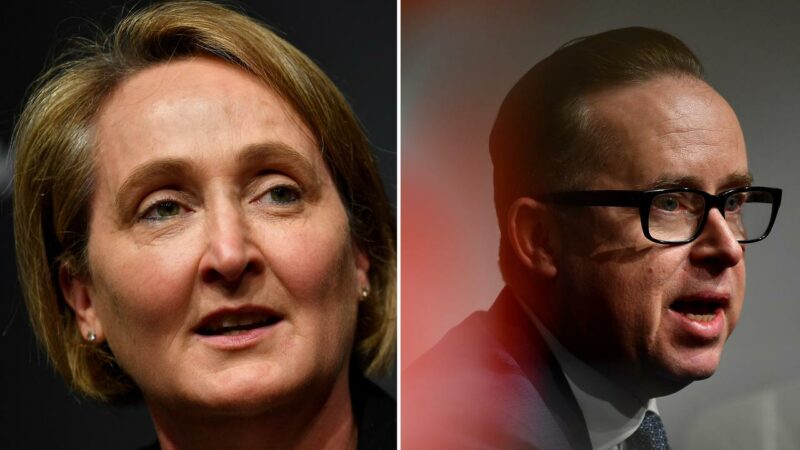Retiring Qantas chief Alan Joyce ran down the airline during his 15 year tenure; his depletion of the fleet and brutal cost cutting sapped customer service and staff morale. Michael Sainsbury reports on the changing of the guard and whether the inevitable corporate makeover may consign low-cost carrier Jetstar to aviation history.
Is it time to retire Jetstar along with Alan Joyce?
When Qantas, then under the leadership of chief executive Geoff Dixon, launched Jetstar under then-wunderkind Alan Joyce, it was designed to bust the Qantas unions.
Jetstar would offer cheap flights to regional and smaller cities – specifically not on major trunk routes – by offering a no frills service operated by pilots, cabin crew, ground staff and maintenance engineers.
Jetstar was also the airline’s bid for regional airlines, a strategy that now lies in tatters with Jetstar Vietnam, since defunct, and a major push into the Chinese market with Jetstar Hong Kong that never got off the ground, despite years of lobbying. Countless trips by Qantas executives and the addition of Macau gambling scion Pansy Ho to head up the final push were to no avail.
With the unions busted and Jetstar now operating on all Qantas’ main trunk routes, its Asian network decimated and in free fall in terms of its cancellations, and legendarily poor customer service, many believe it’s time for the discount carrier to go – along with its original, largely unlamented creator Joyce who will leave the company in November. He’ll be saddle-bags packed with more than $120 million earned in his 15 years as CEO, to be succeeded by CFO Vanessa Hudson.
A new corporate route
Rolling Jetstar back into Qantas, synchronising the two sister airlines’ fleets and using more fuel efficient wide bodied jets on Australia’s main trunk routes, might just be Hudson’s best bet at forging a new strategy for the airline; rather than being the fall-girl for the company’s impending capital spring blowout on planes, and the company’s deteriorating maintenance facilities.
Analysts have estimated that Qantas will be spending $12.3 billion on upgrading its fleet, with Joyce having not paid for one single new aircraft in his 15 years as CEO.
Unions greeted the news of Joyce’s impending departure with, unsurprisingly, unbridled joy.
“Over a decade Alan Joyce has systematically splintered his workforce and driven down standards to the point where Qantas is a shadow of what it once was. Joyce’s position became untenable because Qantas was treated as a corporate vessel for excessive executive bonuses and shareholder dividends.
“Vanessa Hudson must be courageous enough to steer Qantas back to its core purpose: high-quality service for passengers and investment in the hard-working people who built the spirit of Australia,” Transport Workers Union National Secretary Michael Kaine said.
He added that the new CEO must turn Qantas in a new direction away from the dismantling of standards it has seen for the last decade and a half under Joyce’s leadership.
Unions ecstatic
According to Kaine, “today’s announcement is by no means a sign of relief to aviation workers, especially the 1700 illegally sacked ground workers still suffering on the sidelines. But this is a golden opportunity for a reset at Qantas.”
The announcement of the new CEO comes just a week before High Court hearings on the company’s illegal outsourcing of 1700 ground workers.
“If the High Court upholds the verdict of the full Federal Court, Joyce will go down as the CEO of a company that ordered the largest case of illegal sackings in Australian history,” Kaine said. “Clearly that’s a legacy new CEO Vanessa Hudson must strive not to emulate. It’s not a high bar, but one we hope she can surmount and build upon to begin the process of renewing the Spirit of Australia.”
A High Court win by the unions could mean a massive compensation bill for Qantas or the prospect of reemploying sacked staff, Hudson will be thankful that this should all happen on the last leg of Joyce’s watch. It’s also clear that the COVID era sacking went too far in other ways, with Qantas now re-employing training pilots and cabin crew that were previously handed redundancies
While Jetstar was originally Alan Joyce’s baby, he now almost never speaks of Jetstar these days – except when talking up everything, everywhere all at once at the company’s financial results.
When Joyce says “Qantas” these days, and talks up its on-time record, along with the dubious claims in a recent multi-million dollar advertising campaign about the airline being “back to its best” – it’s about Qantas, mainline company not any of its offshoots that include Jetstar and regional arm QantasLink.
While thousands of Jetstar passengers were stranded in places like Bali and Phuket during the summer holidays, Joyce was nowhere to be seen – except perched in the sponsors’ box at the Australian Open tennis tournament where another former Jetstar CEO, Jane Hrdlika, is chair of Tennis Australia.
Jetstar no longer fit for purpose
Jetstar appears no longer fit for purpose as it is no longer necessarily the low cost option, competes with Qantas on lucrative routes and is a financial drag on the company with two sets of executives, maintenance divisions, ground and cabin crews. Again, while this suited the union-busting program, Qantas has continued to push down the wages on its mainline planes.
Pilots and cabin crew have had wages cut with the introduction of Boeing 737s, and it will take a further cut with the incoming A350s and single aisle, pilots told MWM yesterday.
For the Qantas group, competition on the domestic front is only growing. In January, Bonza became the fifth airline (if Jetstar is included as separate to Qantas) to get a licence in Australia. Its planned initial eight aircraft will join Rex, which recently acquired two new planes to take its fleet to 9 737s, plus 61 Saab 340 turboprops, as smaller competitors to Qantas. Insiders say Rex plans to increase its jet fleet to 30 in coming years.
Virgin is planning to re-list on the stock market, which will help it load up with cash to expand its fleet from 75 to 92 737, including the latest 737 MAX aircraft which have longer range and better fuel efficiency.
To take on this competition, pilots who spoke to MWM said that Qantas would be smart to order more wide-bodied A350s and/or 787s to fly its major domestic trunk routes, saving on fuel, pilots and cabin crew and maintenance crew wages by flying bigger planes with lower frequency during peak hours on the Sydney-Melbourne route, one of the world’s busiest.
In the meantime, Qantas’ new single aisle Airbus planes coming to replace its dilapidated 737s in coming years match Jetstar’s, so those fleets will be easy to synchronise.
Add Riyadh Air to Gulf airline competition
Hudson has to get Qantas’ domestic right – and that includes the future of Jetstar as even more competition is ramping up on the international front where Joyce’s refusal to buy new planes is now starting to bite hard. US carrier United has increased its flights on the Pacific route that was once Qantas’ most profitable. Delta and Hawaiian Airlines are now also plying that route between the US and Australia.
On the European front, Qatar Airlines is bidding to increase its flights and its Gulf state rivals Emirates and Etihad operate dozens of flights to and from Australia each week, linking passengers seamlessly to myriad European airlines. They will soon be joined by Saudi Arabia’s new market entrant, Riyadh Air, who plans to service 100 destinations by 2030.
Qantas now operates only two flights to London each day and that’s it. No Frankfurt, Paris or Zurich, it simply does not have enough planes.
In Asia, competition is coming from all directions, especially with low cost Air Asia, which does not have Jetstar’s awful cancellation and delay record, now returning to service Australia and compete with Jetstar to key tourist destinations such as Thailand.
For the short term, Qantas insiders report that bookings remain very healthy but the increased competition that looms for Hudson in the mid to long-term means a good hard look at the battered, under-planed, Jetstar division that is hammering Qantas’ already shattered reputation.
Spirits of Australia soothe pandemic hangover as Alan Joyce hosts hangar party for Qantas’ 100th
Michael Sainsbury is a former China correspondent who has lived and worked across North, Southeast and South Asia for 11 years. Now based in regional Australia, he has more than 25 years’ experience writing about business, politics and human rights in Australia and the Indo-Pacific. He has worked for News Corp, Fairfax, Nikkei and a range of independent media outlets and has won multiple awards in Australia and Asia for his reporting. He is a fierce believer in the importance of independent media.

